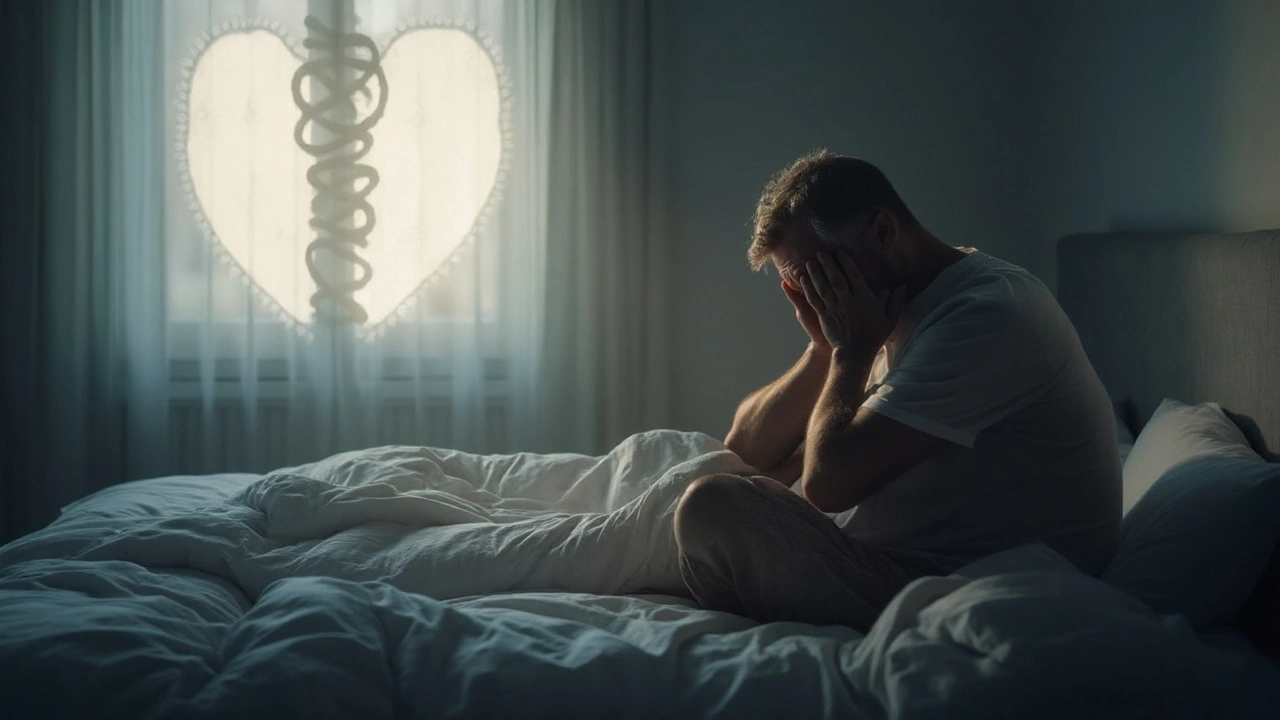
When a man can’t get or keep an erection, the blow to self‑esteem is often deeper than the bedroom. The same goes for a bout of depression that saps desire and confidence. Together they create a loop that feels impossible to escape. This article unpacks why erectile dysfunction and depression feed each other, highlights the hidden medical and lifestyle links, and gives you a clear roadmap to restore both sexual and mental well‑being.
What Is Impotence (Erectile Dysfunction)?
Impotence is a medical condition characterized by the consistent inability to achieve or maintain an erection sufficient for satisfactory sexual activity. It affects roughly 30% of men aged 40-70, according to the American Urological Association, and its prevalence rises with age and comorbid health issues.
Understanding Depression
Depression is a mood disorder marked by persistent sadness, loss of interest, and a range of physical symptoms that impair daily functioning. The World Health Organization estimates that over 260million people worldwide suffer from major depressive disorder, and men often present with somatic complaints rather than classic emotional signs.
How the Two Conditions Reinforce Each Other
The connection isn’t just psychological; it’s a blend of biology, emotions, and behavior.
- Physiological route: Stress hormones like cortisol raise blood pressure and narrow blood vessels, reducing penile blood flow - a key factor in impotence. The same cortisol surge interferes with serotonin regulation, worsening depressive symptoms.
- Psychological route: A failed sexual encounter can trigger feelings of shame and inadequacy, which deepen depressive thoughts. Those thoughts, in turn, lower libido and dampen the brain’s reward pathways, making it harder to become aroused.
- Behavioral route: Men dealing with either condition may withdraw from intimacy, avoid exercise, or over‑use alcohol-behaviors that aggravate both problems.
Shared Risk Factors and Underlying Roots
Identifying common drivers helps you target the real problem rather than just the symptoms.
- Cardiovascular Disease is a group of disorders affecting the heart and blood vessels. Poor vascular health reduces blood flow to the penis and also raises the risk of brain‑derived inflammation linked to depression.
- Testosterone is a primary male sex hormone that influences libido, muscle mass, and mood. Low levels correlate with both weaker erections and depressive moods.
- Lifestyle Factors such as obesity, smoking, excessive alcohol, and sedentary habits contribute to endothelial dysfunction and hormonal imbalance, feeding both conditions.
- Anxiety is a mental health condition that heightens worry and sympathetic nervous system activity. Chronic anxiety spikes adrenaline, which can impair erection and heighten depressive rumination.
- Stress is a psychophysiological response to perceived threats. Persistent stress depletes serotonin and nitric oxide, both essential for mood stability and penile vasodilation.

Treatment Strategies That Attack Both Sides of the Cycle
Effective care usually blends medical, hormonal, lifestyle, and psychological interventions.
Medical Options
- PDE5 Inhibitors are oral medications that enhance nitric‑oxide mediated blood flow to the penis. Common brands include sildenafil, tadalafil, and vardenafil. They work quickly but don’t treat underlying depression.
- SSRIs (Selective Serotonin Reuptake Inhibitors) are first‑line antidepressants. While they lift mood, many cause sexual side effects, including reduced libido and erection issues.
Hormonal Therapy
If blood tests reveal low testosterone, a supervised replacement regimen can improve both sexual function and mood. Monitoring is essential to avoid cardiovascular risks.
Lifestyle Overhaul
- Adopt a heart‑healthy diet rich in omega‑3 fatty acids, whole grains, and antioxidants.
- Exercise at least 150minutes of moderate activity weekly; aerobic workouts improve endothelial health and release endorphins.
- Quit smoking and limit alcohol to two drinks per day; both toxins constrict blood vessels.
Psychotherapy
Cognitive‑Behavioral Therapy is a structured, goal‑oriented psychotherapy that reshapes negative thought patterns. It helps men tackle performance anxiety, re‑frame depressive self‑talk, and adopt healthier coping mechanisms.
Integrated Care Model
The most sustainable outcomes come from a team approach: urologist, psychiatrist, primary‑care physician, and a therapist working together. Regular follow‑ups allow medication tweaks, lifestyle reinforcement, and emotional support.
Comparison of Key Treatment Options
| Option | Primary Mechanism | Effect on Erectile Function | Impact on Mood | Typical Side Effects |
|---|---|---|---|---|
| PDE5 Inhibitors | Enhance nitric‑oxide mediated vasodilation | Improves erection quality within 30‑60min | Neutral; may boost confidence indirectly | Headache, flushing, rare visual disturbances |
| SSRIs | Increase serotonin availability in synaptic cleft | Often reduces libido and erection frequency | Alleviates depressive symptoms over 4‑6 weeks | Sexual dysfunction, nausea, weight gain |
| Testosterone Replacement | Restores physiological testosterone levels | Can modestly improve erection rigidity | Improves mood, energy, and motivation | Polycythemia, prostate concerns, lipid changes |
| Cognitive‑Behavioral Therapy | Restructures negative thought patterns | Indirect - reduces performance anxiety | Significant mood improvement | Time commitment, occasional emotional discomfort |
Practical Checklist: Breaking the Vicious Cycle
Use this step‑by‑step list to start untangling the overlap between impotence and depression.
- Schedule a full medical exam: blood pressure, lipid panel, testosterone, and hormonal profile.
- Discuss symptoms openly with a urologist and a mental‑health professional.
- If prescribed a PDE5 inhibitor, take it on an empty stomach for faster absorption.
- Ask your psychiatrist about antidepressants with lower sexual side‑effects (e.g., bupropion or mirtazapine).
- Begin a 30‑minute brisk walk at least five days a week; track progress in a journal.
- Adopt a Mediterranean‑style diet; note improvements in energy and mood.
- Commit to weekly CBT sessions or a guided mindfulness program.
- Review medication doses after 4‑6 weeks; adjust based on erection quality and mood rating scales.
- Involve your partner in the conversation; intimacy is a team effort.
- Re‑evaluate every three months: use the International Index of Erectile Function (IIEF) and PHQ‑9 questionnaires to measure change.
Related Concepts and Next Steps
Understanding the broader picture helps you spot other areas that may need attention.
- Sexual Dysfunction Spectrum: Beyond impotence, conditions like premature ejaculation or low libido often coexist and deserve separate assessment.
- Quality of Life Measures: Tools such as the SF‑36 can capture how sexual and mental health intertwine with daily functioning.
- Relationship Satisfaction: Couples therapy can address communication gaps that exacerbate both conditions.
- Neurotransmitter Balance: Exploring dopamine‑boosting activities (e.g., hobbies, short‑term goal achievement) can complement medical treatment.
- Future Topics to Explore: “How Exercise Improves Sexual Health,” “Navigating Antidepressant Switching Safely,” and “The Role of Mindfulness in Erectile Function.”

Frequently Asked Questions
Can depression cause a man to lose his erections?
Yes. Depression alters brain chemistry, especially serotonin and dopamine pathways, which are crucial for sexual arousal. The emotional weight of depression also raises cortisol, narrowing blood vessels and reducing penile blood flow.
Do medications for erectile dysfunction worsen depression?
PDE5 inhibitors themselves don’t trigger depressive symptoms. In fact, the confidence boost from better sexual performance can lift mood. However, if a man relies solely on medication without addressing underlying psychological issues, the improvement may be short‑lived.
Which antidepressants are least likely to affect sexual function?
Bupropion (Wellbutrin) and mirtazapine are among the few agents with a lower incidence of sexual side‑effects. Switching should be done under psychiatrist supervision, with a gradual taper of the original SSRI to avoid withdrawal.
How long does it take to see mood improvement after starting a PDE5 inhibitor?
The medication works within an hour for erections, but mood benefits are indirect and can appear over weeks as confidence and intimacy improve. Expect noticeable psychological uplift after 4‑6 weeks of consistent use combined with other lifestyle changes.
Is psychotherapy useful if my main problem is erectile dysfunction?
Absolutely. Cognitive‑behavioral therapy targets performance anxiety, negative self‑talk, and relationship dynamics that often underlie erectile problems. When paired with medical treatment, CBT raises success rates by up to 30%.
Can lifestyle changes reverse both impotence and depression?
Yes, to a large extent. Regular aerobic exercise improves vascular health, boosts testosterone, and releases endorphins that fight depression. A balanced diet, weight loss, and smoking cessation further enhance blood flow, creating a virtuous cycle of better sexual and mental health.

Alan Clark
September 22, 2025 AT 00:50Hey folks, just wanted to say that tackling both the mood slump and the bedroom blues at the same time is totally doable. Start with a simple walk‑run combo a few times a week – the endorphins will boost your vibe and the blood flow helps the willy too. Eating a Mediterranean style plate with nuts and fish can lift testosterone levels without feelin’ like you’re on a strict diet. If you can, book a check‑up to rule out any hidden heart issues, ’cause vascular health is the key link. Remember, every small win adds up, so keep at it and you’ll see progress.
Shouvik Mukherjee
September 22, 2025 AT 01:40It’s great to hear you’re already moving, and adding a few deep‑breathing sessions before bedtime can calm the cortisol spikes that sabotage both mood and performance. Pair that with a brief journal entry about what you’re grateful for each day; it reinforces positive neural pathways and can soften the depressive fog. Also consider a gentle yoga routine that focuses on pelvic flexibility – it’s low impact and supports circulation without stressing the joints.
Ben Hooper
September 22, 2025 AT 02:30Consistent sleep schedule improves hormone balance and reduces anxiety which helps erections and mood alike
Mark Anderson
September 23, 2025 AT 06:00I remember the first time I realized my gym routine was doing more than just shaping my biceps; it was quietly rewiring my confidence. The rush of blood to my muscles mirrored a surge of blood to places that mattered in the bedroom, and suddenly the link felt undeniable. When you jog through a park and feel the wind slap your face, your brain releases dopamine that whispers, “you’ve got this.” That same dopamine rush can lift the heavy curtain of depression that often blocks desire. Adding a handful of almonds and a splash of olive oil to your dinner fuels the endothelial cells, keeping the vessels supple for both heart and penis. A well‑timed dose of a PDE5 inhibitor can be the spark that reignites intimacy, but the real fire comes from the lifestyle pillars you build around it. Think of your health as a symphony: the brass of testosterone, the strings of serotonin, the percussion of nitric oxide-all need to play in harmony. If one instrument is out of tune, the melody falters, which is why regular blood panels are your backstage pass to spotting imbalances early. Counseling isn’t just for “crazy” people; it’s a rehearsal space where you can rewrite the script of performance anxiety into a story of partnership. Couples therapy can teach you both to communicate desires without shame, turning bedroom mishaps into moments of shared growth. Sleep, the unsung hero, repairs neuro‑receptors and balances cortisol, so aim for seven to nine hours of dark, uninterrupted rest. Even a modest 15‑minute meditation before sleep can calm the sympathetic surge that otherwise tightens blood vessels. Swap that nightly beer for a glass of red wine or a herbal tea; the antioxidants protect the lining of arteries, which in turn safeguards erection quality. When you notice progress-whether it’s a stronger erection, a brighter mood, or simply a lighter step-write it down, because reinforcement fuels further change. In the end, the vicious cycle breaks not with a single miracle pill, but with a cascade of intentional choices that strengthen both body and mind. Keep rolling, stay curious, and let each small victory remind you that you’re steering this ship back into calm waters.
Marjory Beatriz Barbosa Honório
September 23, 2025 AT 06:50What a vivid roadmap you painted-each piece feels like a brushstroke on a larger canvas of well‑being. I especially love the metaphor of the symphony; it reminds us that balance, not just brute force, creates lasting harmony. Pairing those lifestyle tweaks with gentle affirmations can keep the momentum alive when motivation wavers. Keep sharing this golden blend of science and soul, it lights the way for many.
G.Pritiranjan Das
September 23, 2025 AT 07:40Every tiny step forward counts.